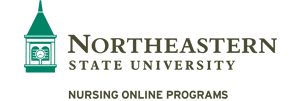Nurse educators are instrumental in shaping the future of healthcare and the next generation of nurses. However, they require a range of core competencies and skills to excel in these positions. Through courses like Nurse Educator Role Development and more, the Northeastern State University (NSU) online Registered Nurse (RN) to Master of Science in Nursing (MSN) in Nursing Education program equips students with the essential traits and knowledge to thrive in the field.
What Do Nurse Educators Do?
Before exploring the skills that today’s nurse educators need, reviewing their day-to-day job can be helpful. Some of the primary tasks and duties of nurse educators include:
- Creating, revising and maintaining nursing curricula
- Delivering lectures, leading discussions and providing hands-on clinical instruction to nursing students
- Designing and conducting assessments to evaluate students’ progress and understanding of nursing concepts
- Supervising students in clinical settings to ensure they gain practical experience and apply theoretical knowledge
- Guiding and supporting students throughout their educational journeys and career paths
What Skills and Knowledge Do Nurse Educators Need?
To ensure the best possible outcomes, nurse educators must possess the following knowledge and skills:
Clinical Competence
Nurse educators must have a deep and up-to-date understanding of nursing practices and evidence-based care, along with clinical skills and expertise, to teach students successfully. While nursing education once focused mainly on acute care, the American Association of Colleges of Nursing has updated nursing competencies, so educators should be knowledgeable in four spheres of care:
- Disease prevention and health
- Chronic disease care and management
- Regenerative or restorative care
- Hospice or palliative care and support
Courses like Professional Nursing Role, Theoretical Foundations for Nursing Practice and Population Health Nursing allow NSU students to further refine their nursing and clinical knowledge in these four spheres.
Curricula Development and Assessment
Nurse educators must create and adapt curricula to meet evolving healthcare needs.
In alignment with the core competencies set by the National League for Nursing, NSU’s Curriculum Development course introduces students to several methods of curriculum design and strategies to adjust educational content to various settings and education levels. Another course, Assessment & Evaluation in Nursing Education, helps graduates measure a curriculum’s effectiveness and ability to meet program objectives.
Cultural Competency and Diversity Awareness
Nurse educators must be adept at fostering an understanding and respect for diverse cultural backgrounds among students and the patients they serve. They must establish an inclusive learning environment that values the impact cultural identity can have on learning style and nursing practice.
The Cultural Perspectives course at NSU offers insight into how beliefs differ among local, regional and global populations.
Utilizing Technology in Learning Environments
Nurses work with technology and informatics daily, so it makes sense for educators to prepare them by incorporating technological tools into the learning environment and instruction techniques. Simulations and skills labs, for example, can enhance the learning experience and allow students to translate theory to practical skills before working directly with a patient.
Nurse educators should prepare to employ various teaching tools and technologies to meet students’ needs and program goals. NSU’s Facilitating Learning for Healthcare Professionals course explores the many ways to construct effective learning environments.
Mentoring and Advising
Nurse educators often mentor students, guiding them through their learning journey and introducing potential career pathways that might suit an individual’s interests and skills. Educators who establish these partnerships with students can increase engagement and program success. NSU students gain firsthand experience and benefit directly from these arrangements when they work closely with a faculty mentor during the Practicum course.
Ultimately, programs like NSU’s online RN to MSN in Nursing Education aim to produce educators with deep clinical and theoretical nursing knowledge and the practical skills and attitudes to shape the future of healthcare and nurses. Through a blend of coursework, hands-on experiences and faculty guidance, graduates are well-prepared to step into nurse educator roles.
Learn more about Northeastern State University’s online RN to MSN in Nursing Education program.


